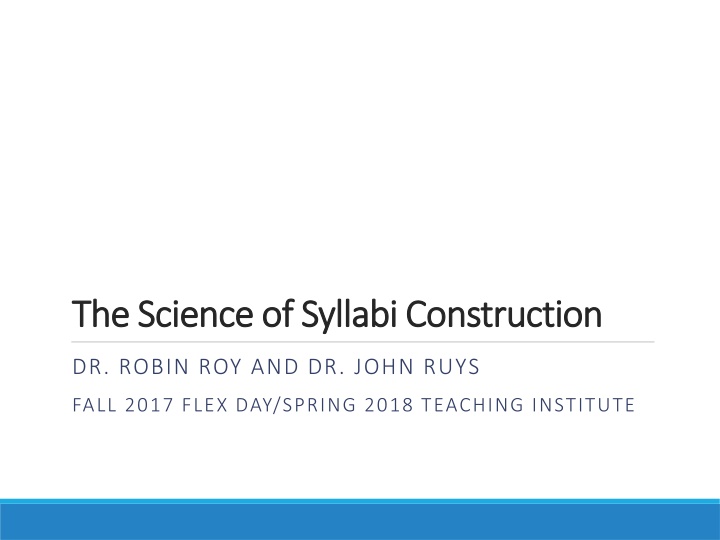
The Science of Syllabi Construction: Effective Strategies and Tips
Explore the concepts of syllabi construction including learner-centered approaches, purposes of a syllabus, and tips for preparing effective syllabi. Learn how a well-crafted syllabus serves as a contract, learning tool, and communication tool. Discover the benefits of learner-centered syllabi, key elements, and general tips for creating engaging syllabi that resonate with students.
Download Presentation

Please find below an Image/Link to download the presentation.
The content on the website is provided AS IS for your information and personal use only. It may not be sold, licensed, or shared on other websites without obtaining consent from the author. If you encounter any issues during the download, it is possible that the publisher has removed the file from their server.
You are allowed to download the files provided on this website for personal or commercial use, subject to the condition that they are used lawfully. All files are the property of their respective owners.
The content on the website is provided AS IS for your information and personal use only. It may not be sold, licensed, or shared on other websites without obtaining consent from the author.
E N D
Presentation Transcript
The Science of Syllabi Construction The Science of Syllabi Construction DR. ROBIN ROY AND DR. JOHN RUYS FALL 2017 FLEX DAY/SPRING 2018 TEACHING INSTITUTE
The science of syllabi construction The purposes of a syllabus Preparing an effective syllabus Learner-centered syllabi General tips for preparing effective syllabi Syllabus quizzes
The purposes of a syllabus The syllabus as a contract (Parkes & Harris, 2002) The syllabus as a permanent record of course requirements and content (Parkes & Harris, 2002) The syllabus as a learning tool for students (Parkes & Harris, 2002) The syllabus as a way to communicate your teaching philosophy and your personality (Richmond, 2017)
Preparing an effective syllabus: Learner-centered syllabi Learner-centered syllabi v. teacher-centered syllabi (Cullen & Harris, 2009; Richmond, 2016) Student perceptions (Richmond, Slattery, Mitchell, Morgan, & Becknell, 2016) As compared to students who read a teacher-centered syllabus, students who read a learner-centered syllabus: Rated the instructor as having better rapport with students Rated the instructor as being more approachable/personable, creative/interesting, encouraging/caring, enthusiastic, flexible/open-minded, and happy/positive Remembered more elements of the syllabus
Preparing an effective syllabus: Learner-centered syllabi Key elements that define a learner-centered approach to syllabi (Cullen & Harris, 2009) An attempt to create community A sharing of power and control of what is learned A focus on assessment tied directly to learning outcomes Rubrics for learner-centered syllabi (Cullen & Harris, 2009; Richmond, 2016) Examples of teacher-centered v. learner- centered language in a syllabus (Richmond, 2016)
Preparing an effective syllabus: General tips Use warm and friendly language (Richmond, 2016) Rationale for assignments (Zinn, 2009) Share personal experiences (Collins & Miller, 1994), humor, and compassion Use of images made no difference in students impressions of the course and the instructor (Harrington & Gabert-Quillen, 2015) Write a longer, more detailed syllabus As compared to students who read a brief syllabus, students who read a more detailed syllabus rated the instructor higher on several characteristics of teacher effectiveness (Saville, Zinn, Brown, & Marchuk, 2010) As compared to students who read short syllabi (6 pages), students who read medium (9 pages) or long (15 pages) syllabi had more positive impressions of the course and the instructor (Harrington & Gabert-Quillen, 2015)
Preparing an effective syllabus: General tips (Richmond, 2017) An effective syllabus should include the following: A statement of your teaching philosophy Information about campus resources Assignment descriptions How to succeed in the course Common pitfalls that students encounter The syllabus should be made available to students before the first day of class
Syllabus quizzes Students who completed a take-home syllabus quiz did better on a subsequent in-class syllabus quiz than students who did not complete the take-home quiz (Raymark & Connor-Greene, 2002) Syllabus quizzes should be worded from the perspective of the instructor, such as, A student comes to you and (Richmond, 2017) More than one syllabus quiz should be given (Richmond, 2017)
References Collins, N. L., & Miller, L. C. (1994). Self-disclosure and liking: A meta- analytic review. Psychological Bulletin, 116, 457-475. http://doi: 10.1037/0033-2909.116.3.457 Cullen, R., & Harris, M. (2009). Assessing learner-centredness through course syllabi. Assessment & Evaluation in Higher Education, 34(1), 115 125. http://doi:10.1080/02602930801956018 Harrington, C. M., & Gabert-Quillen, C. A. (2015). Syllabus length and use of images: An empirical investigation of student perceptions. Scholarship of Teaching and Learning in Psychology, 1, 235 243. http://dx.doi.org/10.1037/stl0000040 Parkes, J., & Harris, M. B. (2002). The purposes of a syllabus. College Teaching, 50(2), 55 61. http://doi:10.1080/87567550209595875
References Raymark, P. H., & Connor-Greene, P. A. (2002). The syllabus quiz. Teaching of Psychology, 29(4), 286-288. Richmond, A. S. (2016). A primer for constructing a learner-centered syllabus: One professor s journey. IDEA, #60, 1-14. Retrieved from http://www.ideaedu.org/Portals/0/Uploads/Documents/IDEA%20Paper s/IDEA%20Papers/PaperIDEA_60.pdf Richmond, A. S. (2017, April). Becoming America s next top model teacher. Paper presented at the meeting of the Western Psychological Association, Sacramento, CA. Richmond, A. S., Slattery, J., Morgan, R., Mitchell, N., & Becknell, J. (2016). Can a learner-centered syllabus change students perceptions of student-professor rapport and master teacher behaviors? Scholarship of Teaching and Learning in Psychology, 2, 159-168. http://dx.doi.org/10.1037/stl0000066
References Saville, B. K., Zinn, T. E., Brown, A. R., & Marchuk, K. A. (2010). Syllabus detail and students perceptions of teacher effectiveness. Teaching of Psychology, 37, 186 189. http:// doi:10.1080/00986283.2010.488523 Zinn, T. E. (2009, October). But I really tried! Helping students link effort and performance. Observer, 22(8), 27-30.
